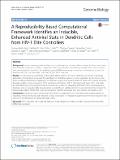A Reproducibility-Based Computational Framework Identifies an Inducible, Enhanced Antiviral State in Dendritic Cells from HIV-1 Elite Controllers
Author(s)
Martin-Gayo, Enrique; Ouyang, Zhengyu; Cronin, Jacqueline; Lichterfeld, Mathias; Yosef, Nir; Cole, Michael B.; Walker, Bruce D.; Yu, Xu G.; Kolb, Kellie Elizabeth; Kazer, Samuel Weisgurt; Ordovas-Montanes, Jose Manuel; Shalek, Alexander K; ... Show more Show less
Download13059_2017_Article_1385.pdf (1.941Mb)
PUBLISHER_CC
Publisher with Creative Commons License
Creative Commons Attribution
Terms of use
Metadata
Show full item recordAbstract
Background
Human immunity relies on the coordinated responses of many cellular subsets and functional states. Inter-individual variations in cellular composition and communication could thus potentially alter host protection. Here, we explore this hypothesis by applying single-cell RNA-sequencing to examine viral responses among the dendritic cells (DCs) of three elite controllers (ECs) of HIV-1 infection.
Results
To overcome the potentially confounding effects of donor-to-donor variability, we present a generally applicable computational framework for identifying reproducible patterns in gene expression across donors who share a unifying classification. Applying it, we discover a highly functional antiviral DC state in ECs whose fractional abundance after in vitro exposure to HIV-1 correlates with higher CD4+ T cell counts and lower HIV-1 viral loads, and that effectively primes polyfunctional T cell responses in vitro. By integrating information from existing genomic databases into our reproducibility-based analysis, we identify and validate select immunomodulators that increase the fractional abundance of this state in primary peripheral blood mononuclear cells from healthy individuals in vitro.
Conclusions
Overall, our results demonstrate how single-cell approaches can reveal previously unappreciated, yet important, immune behaviors and empower rational frameworks for modulating systems-level immune responses that may prove therapeutically and prophylactically useful.
Date issued
2018-01Department
Massachusetts Institute of Technology. Institute for Medical Engineering & Science; Massachusetts Institute of Technology. Department of ChemistryJournal
Genome Biology
Publisher
Biomed Central Ltd.
Citation
Martin-Gayo, Enrique, et al. “A Reproducibility-Based Computational Framework Identifies an Inducible, Enhanced Antiviral State in Dendritic Cells from HIV-1 Elite Controllers.” Genome Biology, vol. 19, no. 1, Dec. 2018.
Version: Final published version
ISSN
1474-760X